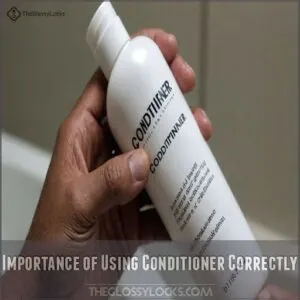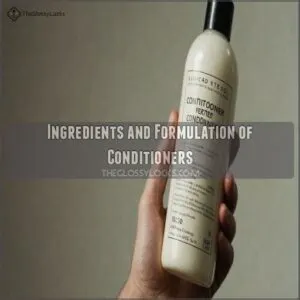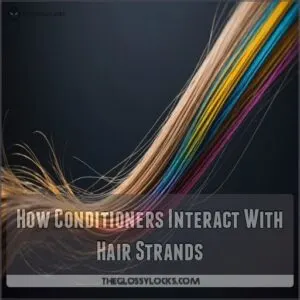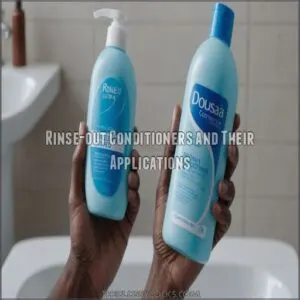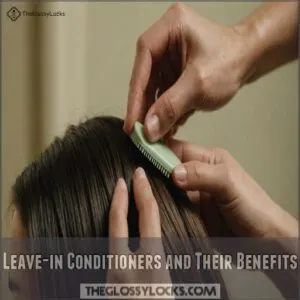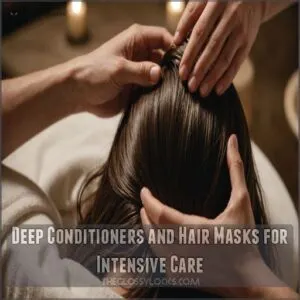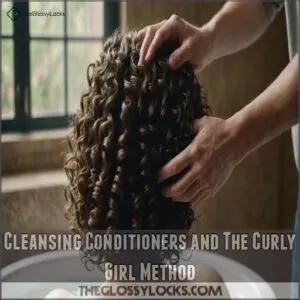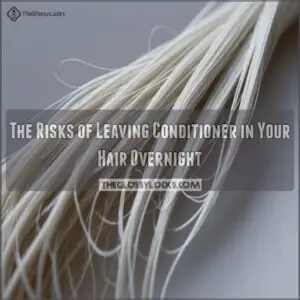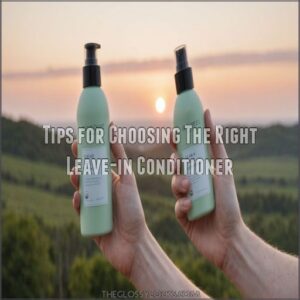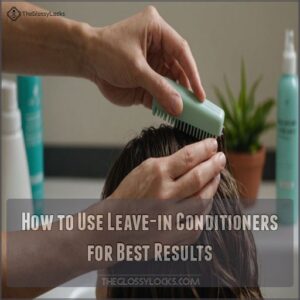This site is supported by our readers. We may earn a commission, at no cost to you, if you purchase through links.
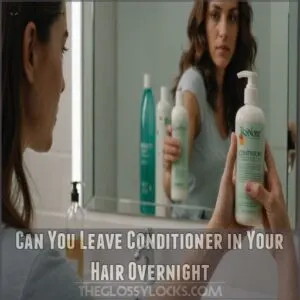 While you might think leaving conditioner in your hair overnight is a smart shortcut to silky-smooth locks, it’s actually not a great idea.
While you might think leaving conditioner in your hair overnight is a smart shortcut to silky-smooth locks, it’s actually not a great idea.
Regular rinse-out conditioners aren’t designed for extended use and can cause product buildup, scalp irritation, and even hygral fatigue (excessive moisture that weakens your hair).
You’ll want to stick to the recommended 3-5 minutes for regular conditioners.
However, if you’re craving that extra moisture boost, there are specially formulated leave-in conditioners and overnight hair masks that’ll give your hair the TLC it needs without the unwanted side effects.
The secret lies in choosing the right product for your specific hair type.
Table Of Contents
- Key Takeaways
- Importance of Using Conditioner Correctly
- Can You Leave Conditioner in Your Hair Overnight
- How Conditioners Work
- The Risks of Leaving Conditioner in Your Hair Overnight
- Benefits of Using Leave-in Conditioners
- How to Use Leave-in Conditioners for Best Results
- Frequently Asked Questions (FAQs)
- What happens if you leave conditioner in your hair overnight?
- What are the ways to stop hair fall?
- Can you leave conditioner in overnight?
- Can you leave a conditioner in your hair?
- Can you sleep overnight with conditioner in your hair?
- Can you leave a rinse out conditioner in your hair overnight?
- Will overnight conditioning help repair severely damaged hair?
- How often should I deep condition my hair?
- Can overnight conditioning affect hair dye or color?
- Which oils can replace conditioner for overnight treatment?
- Does hair porosity affect overnight conditioning results?
- Conclusion
Key Takeaways
- Don’t leave regular rinse-out conditioner in your hair overnight as it can cause hygral fatigue, product buildup, and scalp irritation.
- You’ll want to stick to using regular conditioners for 3-5 minutes during your shower routine for best results.
- If you need extra moisture, use specially formulated leave-in conditioners or overnight hair masks that are designed for extended wear.
- You can protect your hair’s health by choosing the right type of conditioner for your hair type and following the product’s recommended usage instructions.
Importance of Using Conditioner Correctly
You’ll save your hair from potential damage when you understand how to use conditioner properly, as different types serve different purposes for your hair care routine.
Leave-in conditioners aren’t designed to be left in your hair overnight, while your regular rinse-out conditioner works wonders during shower time.
Benefits of Conditioners for Hair Health
Behind every great hair day lies a secret weapon: your conditioner.
It’s your hair’s best friend, forming a protective shield that locks in moisture and keeps those strands silky smooth.
Consider taking it to the next level with a leave-in conditioner treatment.
You’ll notice less breakage, easier detangling, and that coveted shine we all dream about.
Plus, it helps control frizz and supports healthy hair growth by preventing damage and split ends.
Types of Conditioners and Their Uses
Your hair care routine deserves the right conditioner for the best results, as choosing a conditioner that matches your hair type is important – for example, curly hair requires a moisturizing conditioner to provide hydration and manage frizz, as explained in the guide to Different Types of Hair Conditioner.
Here’s a quick guide to the main types of conditioners you’ll find on the market:
- Rinse-out conditioners work their magic in just 3-5 minutes after shampooing
- Leave-in conditioners provide all-day protection without weighing down your locks
- Damaged hair often appears dry and brittle, lacking natural shine and feeling parched, which may be a sign that a hair care product is needed to combat breakage. Deep conditioners and masks deliver intensive repair for damaged hair
- Cleansing conditioners (co-wash) gently clean while moisturizing curly hair
Can You Leave Conditioner in Your Hair Overnight
If you’ve ever wondered whether leaving conditioner in your hair overnight will give you silky-smooth locks, you’ll want to think twice about this popular beauty hack.
While it might seem like a good way to deeply moisturize your hair, leaving regular rinse-out conditioner on too long can actually lead to hygral fatigue and damaged strands.
Risks of Leaving Regular Conditioner in Hair
Leaving regular conditioner in overnight can wreak havoc on your hair’s health. Here’s what happens when conditioner overstays its welcome:
| Risk Factor | Impact on Hair | Effect on Scalp |
|---|---|---|
| Moisture Overload | Weakened elasticity | Bacterial growth |
| Product Buildup | Limp, heavy texture | Clogged follicles |
| Chemical Exposure | Cuticle damage | Irritation |
| pH Imbalance | Brittle strands | Flaking |
| Protein Loss | Split ends | Inflammation |
Think of conditioner like watering plants – too much of a good thing leads to root rot.
Exceptions to The Rule
While regular conditioners shouldn’t stay in overnight, there are exceptions.
Deep conditioners and specialized overnight hair masks, which can be especially beneficial for hair that may be exhibiting signs of dryness, such as roughness and brittleness due to lack of moisture treatments, are specifically formulated for extended use, especially for those with extremely dry or damaged hair.
If you’re dealing with chemically treated, coarse, or very curly hair, these overnight treatments can work wonders.
Just make sure to check the product label – it should explicitly state it’s safe for overnight use.
How Conditioners Work
You’ll find tiny positively charged molecules in your conditioner that stick to your negatively charged hair strands like tiny magnets.
These molecules create a protective coating that smooths your hair’s surface and locks in moisture, much like putting on an invisible shield for your strands.
Ingredients and Formulation of Conditioners
Inside every bottle of conditioner, you’ll find a carefully crafted blend of ingredients working together like a well-orchestrated symphony.
Natural ingredients like jojoba oil and aloe vera pair with conditioning agents to nourish your strands.
Most formulas contain protein-rich compounds and botanical extracts, while silicone-based conditioners create that silky-smooth feeling.
These ingredients are chosen specifically to target different hair concerns and types.
How Conditioners Interact With Hair Strands
Through ionic bonding, conditioner molecules work like tiny magnets on your hair strands. The positively charged ingredients attach to your negatively charged hair cuticles, creating a protective shield that locks in moisture and boosts elasticity.
- Your hair feels instantly smoother as thousands of conditioning molecules embrace each strand
- The protective barrier fights frizz like a personal bodyguard
- Using a deep conditioning treatment like deep conditioning for moisture can help lock in your hair’s natural oils. Your hair’s natural moisture gets sealed in, making it bounce with life
Rinse-out Conditioners and Their Applications
Rinse-out conditioners are your hair’s daily dose of TLC.
After coating your strands with shampoo’s cleansing agents, these conditioners step in to restore moisture and manageability.
Here’s a quick guide to rinse-out conditioning basics:
| Hair Type | Application Time | Frequency | Amount | Focus Areas |
|---|---|---|---|---|
| Fine | 1-2 minutes | Every wash | Quarter-size | Mid to ends |
| Medium | 2-3 minutes | Every wash | Half-dollar | Ends to mid |
| Thick | 3-5 minutes | Every wash | Dollar-size | All over |
| Coily | 5-7 minutes | Every wash | Quarter-size x2 | Root to tip |
| Color-treated | 3-5 minutes | Every wash | Half-dollar | Full length |
Leave-in Conditioners and Their Benefits
Leave-in conditioners offer a game-changing approach to daily hair care.
Unlike regular conditioners, these lightweight formulas work throughout the day, protecting your strands from environmental damage while keeping them silky smooth.
They’re especially beneficial for color-treated and dry hair, providing continuous moisture without weighing hair down.
You’ll find options packed with natural ingredients like jojoba oil and essential fatty acids for the best possible hair health.
Deep Conditioners and Hair Masks for Intensive Care
When your hair needs extra TLC, deep conditioners and hair masks step in as your intensive care superheroes.
Think of them as a spa day for your strands – packed with nourishing oils and proteins that penetrate deeply.
You’ll want to use these treatments once or twice a month, leaving them on for 15-30 minutes.
For best results, wrap your hair in a warm towel to help the ingredients sink in.
Cleansing Conditioners and The Curly Girl Method
After deep treatments, you might be ready to shake up your routine completely.
Cleansing conditioners, also known as co-wash products, offer a gentle alternative to traditional shampoos, and can be used as a rinsing conditioner technique to maintain moisture balance.
They’re a cornerstone of the Curly Girl Method, which ditches harsh sulfates for a kinder approach to hair care.
You’ll find these products work wonders for wavy and curly hair types, cleaning while maintaining your hair’s natural moisture balance.
The Risks of Leaving Conditioner in Your Hair Overnight
While you might think leaving conditioner in your hair overnight will give you silky-smooth locks, you’re actually risking damage to your hair and scalp.
Your well-intentioned conditioning session can lead to hygral fatigue, product buildup, and irritated scalp conditions that’ll leave you with more hair troubles than you started with.
Hygral Fatigue and Its Consequences
Your hair is like a sponge – too much soaking can lead to hygral fatigue, a common issue when you leave conditioner in overnight.
This repeated swelling and shrinking of hair strands creates three major problems:
- Weakened hair structure leading to breakage
- Loss of natural elasticity and bounce
- Permanently raised cuticles that make your hair look dull
Think of it like overwatering a plant – sometimes less is more for healthy hair.
Product Buildup and Scalp Irritation
Beyond the surface level, leaving conditioner in overnight poses risks for your scalp health.
The product can clog hair follicles, leading to irritation and flaking.
Think of it like wearing a thick moisturizer to bed – your scalp needs to breathe too.
Disrupting your scalp’s pH balance, similar to mixing shampoos, can also trigger irritation.
Regular overnight conditioning might trigger conditions like dandruff, psoriasis, or dermatitis.
Instead, stick to the recommended time on the label for residue-free results.
Flat and Limp Hair From Over-Conditioning
Using deep conditioning techniques, such as those involving hair porosity and moisturizing products, can help prevent excessive conditioning. Excessive conditioning wreaks havoc on your hair’s natural texture, leaving you with lifeless, weighed-down locks. When you leave conditioner in overnight, you’re likely to wake up with flat, limp hair that’s lost its bounce and energy.
- Your once-bouncy curls now hang like wet spaghetti
- That expensive haircut loses its shape and volume
- Your scalp feels uncomfortably greasy
- Styling becomes a frustrating battle
- Your hair looks dull and feels heavy, like it’s dragging you down
Benefits of Using Leave-in Conditioners
You’ll love how leave-in conditioners can transform your dry, unmanageable hair into silky-smooth locks with their blend of nourishing ingredients and vitamins.
Unlike regular rinse-out conditioners that you wash away, these lightweight formulas stay in your hair to protect against damage while keeping your strands hydrated and frizz-free throughout the day.
Advantages of Leave-in Conditioners for Hair Health
Leave-in conditioners pack a powerful punch in terms of hair health.
Unlike regular conditioners, they’re specially formulated to provide lasting hydration without weighing your hair down.
You’ll notice improved frizz control, better color protection, and enhanced heat protection throughout the day.
Plus, they make detangling a breeze.
Think of them as your hair’s daily vitamin boost – working silently to keep those strands happy and healthy.
Tips for Choosing The Right Leave-in Conditioner
Choosing the right leave-in conditioner doesn’t have to feel like searching for a needle in a haystack.
When shopping for your perfect match, focus on these key factors:
Check the ingredients list for natural moisturizers like argan oil or shea butter that match your hair type.
You can also explore online stores for overnight hair mask products best overnight hair masks.
Consider your budget – premium isn’t always better.
Test the product’s scent first, as you’ll be smelling it all day.
Remember, trusted brands often deliver consistent results.
How to Use Leave-in Conditioners for Best Results
You’ll get the most out of your leave-in conditioner by applying it correctly to damp, towel-dried hair, starting from the ends and working your way up.
Leave-in conditioners are specially formulated to stay in your hair until your next wash, giving you lasting protection and moisture without causing buildup.
Application and Distribution Techniques
Three simple steps will help you get the most from your leave-in conditioner.
Start with damp (not soaking) hair, then apply product from mid-lengths to ends using your fingers like a comb.
For the best products, shop a variety of leave-in conditioners overnight online at leave-in conditioner products.
| Step | Technique | Pro Tip |
|---|---|---|
| 1 | Section hair into quarters | Use clips to keep things tidy |
| 2 | Apply product in downward motions | Work from bottom to top |
| 3 | Distribute with wide-tooth comb | Gentle strokes prevent breakage |
Remember to focus extra attention on your ends, where damage tends to show up first.
Frequently Asked Questions (FAQs)
What happens if you leave conditioner in your hair overnight?
Leaving regular conditioner in your hair overnight can damage strands through hygral fatigue, and similar to heat damage from styling tools like curling irons, which can be prevented with a heat protectant spray fixing burnt hair styles, and cause scalp irritation.
Instead, use a specialized leave-in conditioner that’s designed for extended wear to protect your hair.
What are the ways to stop hair fall?
You’ll need a battle plan to win the war against hair fall: eat protein-rich foods, massage your scalp daily, minimize heat styling, take biotin supplements, and reduce stress through meditation or exercise.
Eat protein-rich foods.
Massage your scalp daily.
Minimize heat styling.
Take biotin supplements.
Reduce stress through meditation or exercise.
Can you leave conditioner in overnight?
Regular conditioner shouldn’t stay in your hair overnight as it can cause hygral fatigue and scalp irritation.
If you’re seeking extended moisture, opt for a specialized leave-in conditioner that’s designed for longer wear.
Can you leave a conditioner in your hair?
While it’s safe to use leave-in conditioners as directed, regular rinse-out conditioners should only stay in your hair for 3-5 minutes.
Using the wrong type or duration can damage your hair’s health.
Can you sleep overnight with conditioner in your hair?
Leaving regular conditioner in your hair overnight isn’t recommended.
It can lead to hygral fatigue, damaging your strands and causing scalp irritation.
Instead, use a specially formulated leave-in conditioner for overnight moisture.
Can you leave a rinse out conditioner in your hair overnight?
It’s best not to leave rinse-out conditioner in your hair overnight. You’ll risk hygral fatigue, product buildup, and scalp irritation. Instead, use a leave-in conditioner designed for extended wear.
Will overnight conditioning help repair severely damaged hair?
You might think overnight conditioning saves your damaged hair, but it won’t. Instead, use a proper leave-in conditioner and deep conditioning treatments weekly. Excessive moisture can actually weaken your strands.
How often should I deep condition my hair?
Deep condition your hair every 1-2 weeks for normal hair, or weekly for damaged, chemically-treated, or curly hair.
Don’t overdo it – too much conditioning can make hair limp and greasy.
Can overnight conditioning affect hair dye or color?
Overnight conditioning can strip fresh hair color, causing it to fade prematurely.
Leave-in conditioner during the day is a better choice for color-safe moisture.
Which oils can replace conditioner for overnight treatment?
Natural alternatives like coconut, argan, and jojoba oils work wonders for overnight hair treatments.
They’ll nourish your strands without risking product buildup.
For best results, warm the oil slightly before applying.
Does hair porosity affect overnight conditioning results?
Your hair’s ability to absorb and retain moisture, which is determined by its cuticle structure and hair porosity, affects how well it will respond to different conditioning treatments. Your hair’s porosity level directly impacts how it absorbs overnight conditioning treatments.
High-porosity hair soaks up more product but risks over-conditioning.
Low-porosity hair needs lighter application to avoid product buildup.
Conclusion
Like a gentle morning breeze waking up your senses, proper hair care routines can transform your locks.
While you might be tempted to leave conditioner in your hair overnight, it’s best to stick with products specifically designed for extended use.
Instead of regular conditioners, opt for leave-in treatments or overnight masks that’ll give your hair the moisture it craves without risking damage.
Remember, healthy hair isn’t about quick fixes – it’s about using the right products correctly.

